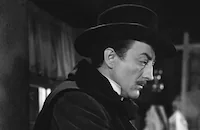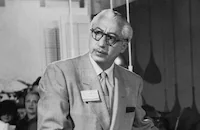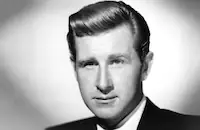You may already know the basic premise since it was remade as Heaven Can Wait with Warren Beatty in 1978 and more recently as Down to Earth (2001) with Chris Rock. Joe Pendleton (Robert Montgomery) is a saxophone-playing boxer who is plucked from an airplane disaster by a heavenly messenger (Edward Everett Horton). In his haste, the messenger neglects to save Pendleton's body from being destroyed in the crash so a new 'vessel' must be found for the former athlete's spirit. Mr. Jordan (Claude Rains), who is in charge of newly arrived souls in Heaven, solves the dilemma by placing Pendleton inside the body of just-murdered millionaire Bruce Farnsworth and revives him, completely baffling Farnsworth's evil wife (Rita Johnson) and her lover (John Emery). Complicating matters even further are Farnsworth's romance with a woman (Evelyn Keyes) handling a financial crisis for her father and his preparation for a championship boxing match under Pendleton's former trainer (James Gleason).
In spite of its outlandish premise, Here Comes Mr. Jordan successfully suspends one's disbelief through its expert performances, witty dialogue, and energetic direction by Alexander Hall. Audiences certainly bought it lock, stock and barrel, but critics loved it too and it garnered seven Oscar nominations, winning Academy Awards for Best Original Story (Harry Segall) and Best Screenplay (Sidney Buchman and Seton I. Miller).
A sterling example of an A-picture produced within the studio system, Here Comes Mr. Jordan was actually seen as a risky venture for Columbia Pictures. Studio mogul Harry Cohn had his doubts about the film's commercial prospects and was also getting heat from the company's East Coast financial advisors, who thought Cohn should play it safe and only make pictures based on past successes. At this point, screenwriter Sidney Buchman conferred with Cohn and convinced him to try something different. Once Cohn committed to the project, he borrowed Robert Montgomery from MGM, even though the actor was not happy to be on loan to Columbia (It was considered "poverty row" compared to the lavish productions of Metro-Goldwyn-Mayer). Yet, despite Montgomery's delightful performance in the lead (he received an Oscar nomination for Best Actor) it is Claude Rains and James Gleason who prove to be the chief scene stealers in Here Comes Mr. Jordan. Gleason, like Montgomery, was also honored for his performance and received a Best Supporting Actor nomination that same year.
Heaven Can Wait, the title of the original play that was adapted for Here Comes Mr. Jordan is often confused with the 1943 movie, Heaven Can Wait, starring Don Ameche and directed by Ernst Lubitsch. The latter, though also a comic fantasy, has no relation to the Harry Segall play and deals instead with a playboy who reviews his notorious past while awaiting entrance into Hades.
Producer: Everett Riskin
Director: Alexander Hall
Screenplay: Harry Segall (play Heaven Can Wait), Sidney Buchman, Seton I. Miller
Art Direction: Lionel Banks
Cinematography: Joseph Walker
Costume Design: Edith Head
Film Editing: Viola Lawrence
Original Music: Frederick Hollander
Principal Cast: Robert Montgomery (Joe Pendleton/Bruce Farnsworth/ Ralph Murdoch), Evelyn Keyes (Bette Logan), Claude Rains (Mr. Jordan), Rita Johnson (Julia Farnsworth), Edward Everett Horton (Messenger 7013), James Gleason (Max 'Pop' Corkle), John Emery (Tony Abbott).
BW-94m.
by Jeff Stafford








































